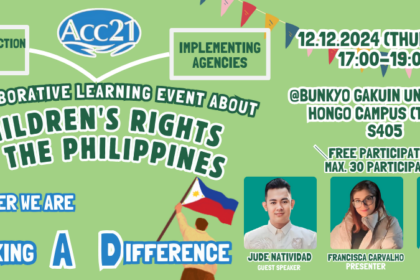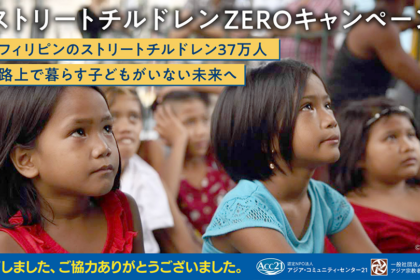A collaborative event on Child rights in the Philippines (Report on the event of the 12th Dec. 2024)
On the evening of December 12, 2024, An international student from university in Holland and a Japanese university student working as interns/staff at ACC21, a Japanese NGO for international cooperation, organized a face-to-face event entitled “Together We Are Making A Difference” at Bunkyo Gakuin University in Tokyo.
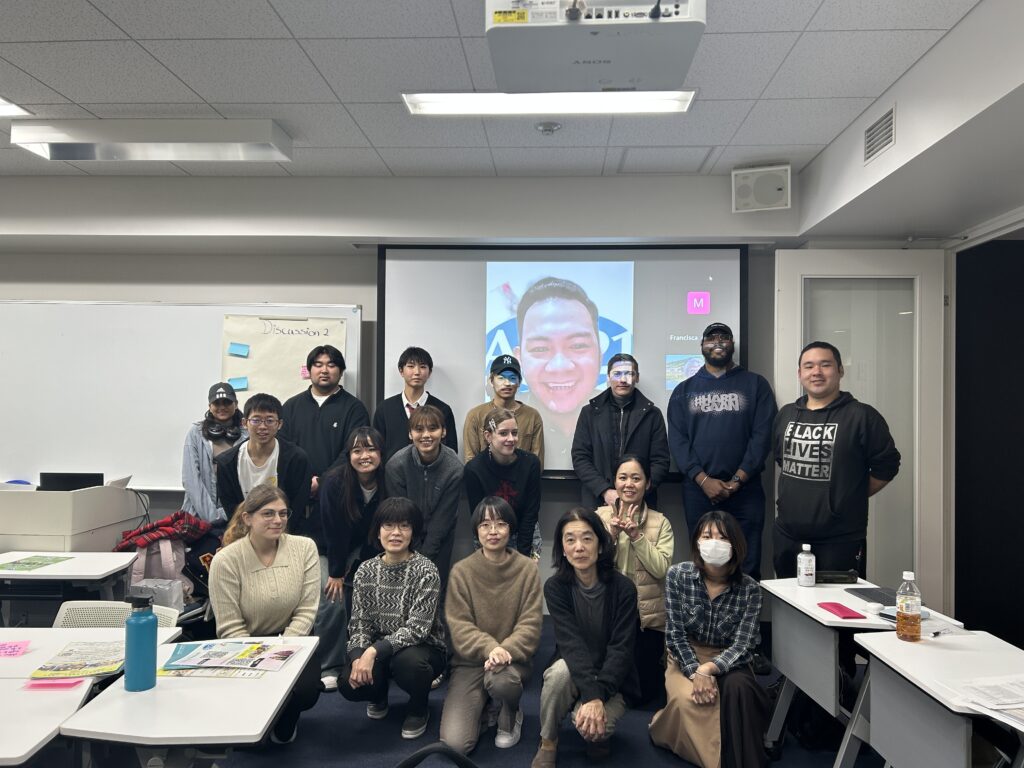
This event was a collaborative learning event about child rights, where the main line was Together we are Making A Difference (MAD). The event had 17 participants and was hosted and presented by ACC21’s International Intern, Francisca Carvalho and student staff member, Mei Ishiyama, with a guest speaker Jude Natividad, a former street child and now a staff of Childhope Philippines Foundation as well as a consultant of ACC21, presented online from the Philippines.
The event included presentations, group discussions, and a game to make learning fun and participatory for the participants.
Convention on the Rights of the Child (CRC)
The first presenter, Mei Ishiyama, explained about ACC21 with its vision, mission and main programs, one of which is Empowering Street Children in the Philippines. Then she talked about what Child rights are, with the United Nations Convention on the Rights of the Child (UNCRC) as its main focus.
First, she explained the definition of the UNCRC, emphasizing it as an international agreement among the ratified member countries of the United Nations.
She highlighted the historical context of the UNCRC. After 30 years of the 1959 Declaration on the Rights of the Child, the UNCRC was adopted at the 44th UN General Assembly in 1989 as a result of efforts to create a framework for comprehensively guaranteeing children’s basic human rights including the right to participation, which is important to create a child-centered society.
She then broke down the four pillars of the CRC for everyone to understand:
- Survival: Right to a registered name and nationality, to be cared for and protected by the parents, and not to be separated from the parents unless it is in the child’s best interest, such as in cases of neglect or abuse.
- Protection: Right to be protected from various forms of harm, including violence, abuse, neglect, drug abuse, sexual exploitation, and armed conflict.
- Development: Parental responsibilities, the right to an adequate standard of living, and the right of children with disabilities to equal opportunities for development and education.
- Participation: Right to be heard, freedom of association, and access to information from the media.
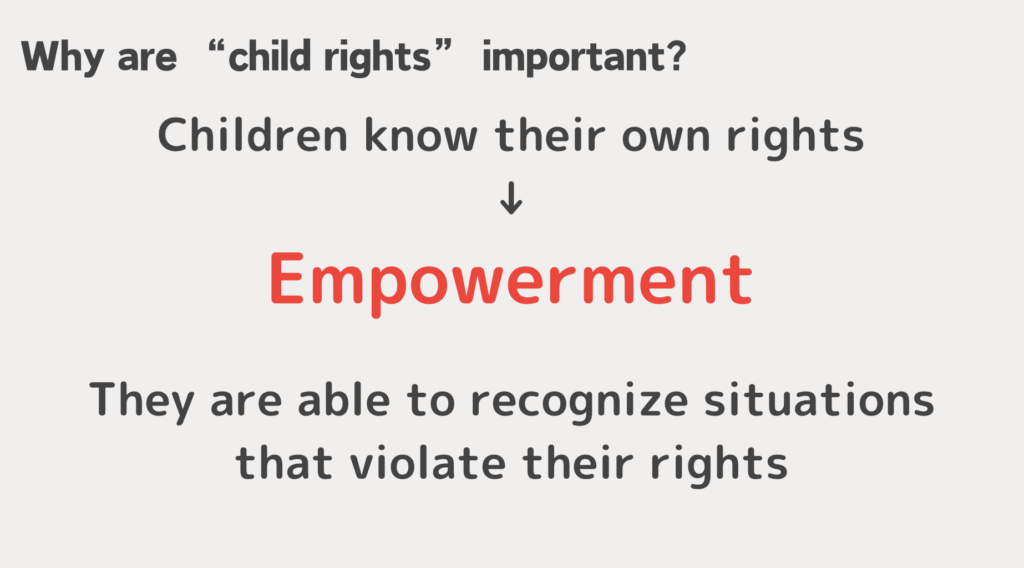
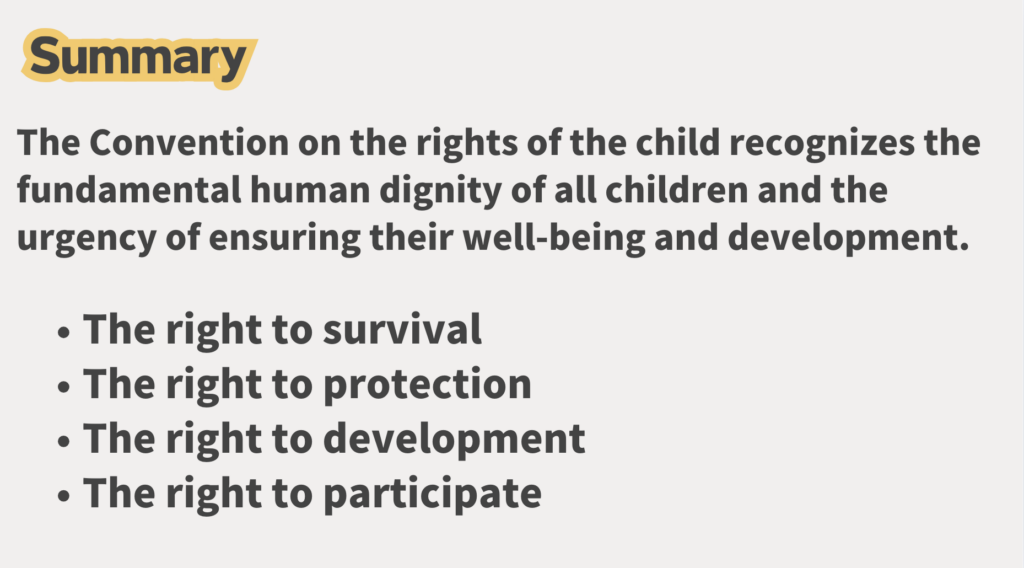
Child Protection Laws in the Philippines
Followed by presenter, Francisca Carvalho, where she talked about child protection laws in the Philippines. Francisca discussed the history of child protection laws in the Philippines, the four pillars of the child connected to the protection laws in the Philippines, and the role of social workers in child protection. She also talked about the importance of community involvement and stakeholder collaboration in making a difference in child protection.
She presented a historical overview, emphasizing the impact of global events like World Wars on children’s treatment and the subsequent emergence of child protection frameworks.
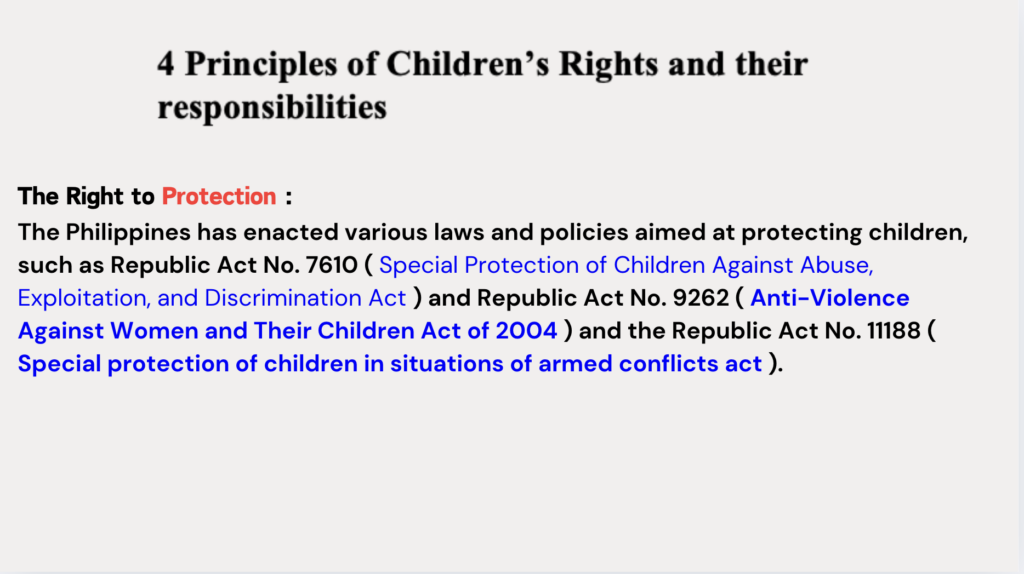
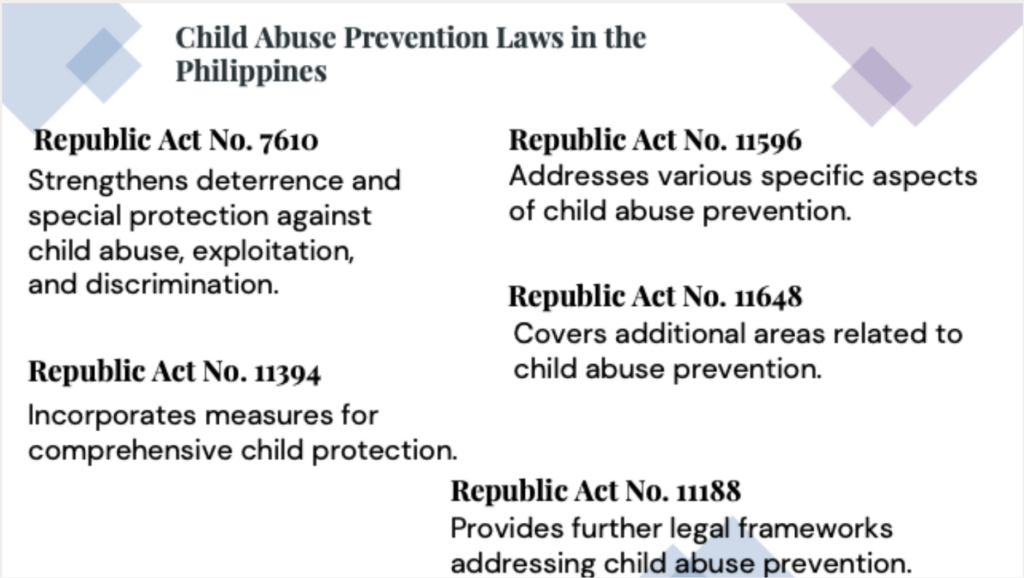
Francisca then connected the Philippine laws on child protection to the four pillars of child protection:
- Survival: She highlighted the challenges faced by children living in poverty and the role of organizations like ACC21 and Childhope Philippines in supporting these children.
- Protection: She discussed key Philippine laws like Republic Acts 7610, 9262, and 11188, which address child abuse, exploitation, discrimination, violence against women and children, and protection during armed conflict.
- Development: She underscored the importance of free and compulsory education and the role of the Department of Education in ensuring access to education for all children, including those with disabilities and diverse backgrounds.
- Participation: Francisca noted that Sangguniang Kabataan (abbreviated as SK) or Youth councils in the Philippines represents youths in a barangay, the smallest administrative division in the Philippines, but also acknowledged the challenges in ensuring the participation of marginalized children.
She emphasized the importance of raising awareness about child rights, engaging in community involvement, and collaborating with stakeholders. Francisca also offered a social worker’s perspective, emphasizing the need for social workers to play their roles in advocating for children’s rights, addressing injustices to ensure the well-being and safety of children.
Doing good is the real reason why we are living
The guest speaker, Jude Natividad, joined online from the Philippines. Jude shared his personal experience as a former street child. He talked about the various challenges he faced when he lived on the streets, how he was helped by Childhope Philippines Foundation which provided educational and other supports, and his current work for “Project Bamboo” (the joint project of Childhope and ACC21) and “Zero Street Children in the Philippines Campaign” (the joint of ACC21 and ACRP Tokyo). Then Jude encouraged the participants to help children in street situations through the initiatives that he mentioned earlier. He also talked about the realities of protection laws for children in the Philippines and the education system in the Philippines.
Story about his life on the streets
His narrative began with the forced demolition of his family home when he was only six years old, leaving them in a precarious situation due to his father’s mental illness and his mother’s inability to support them. Jude shared his experiences of begging, collecting bottles, selling garbage, and working as a parking attendant to help his family. Judes’s life took a turn when he joined Childhope Philippines and participated in their activities. This led him to receive support to return to school and develop as a youth leader, but had to drop out again to help his mother financially and be able to send his older brother to school so he could graduate.
During the time, Childhope Philippines continued to empower him, training him as a youth leader and helping him advocate for children’s rights.
He eventually graduated college in 2022 and dedicated himself to working with organizations like Childhope Philippines and ACC21, helping other children in street situations.
From his life story, we learned that support, including educational support and advocacy for the promotion of children’s rights, was one of the important conditions for him to recover from his many difficulties.
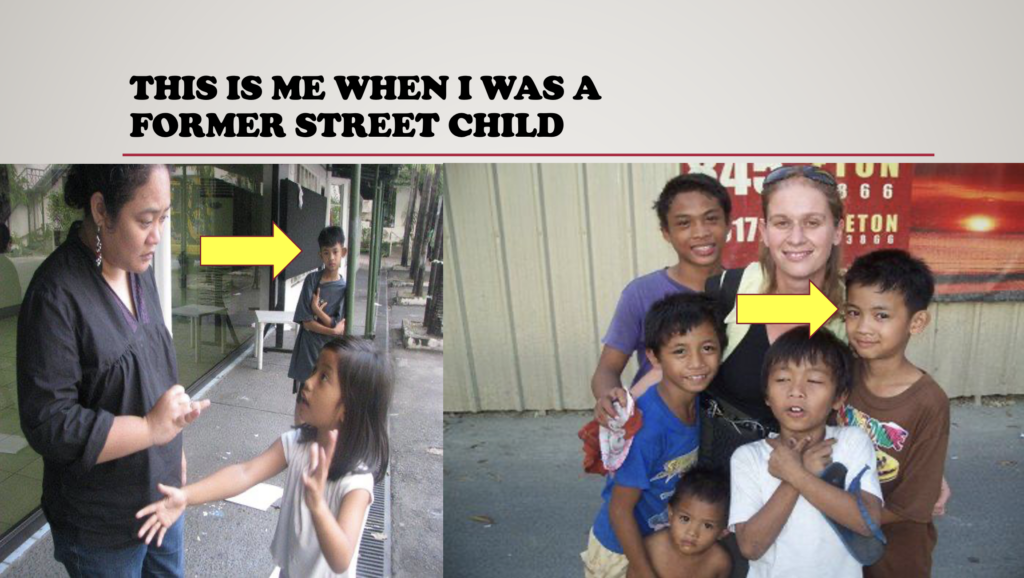
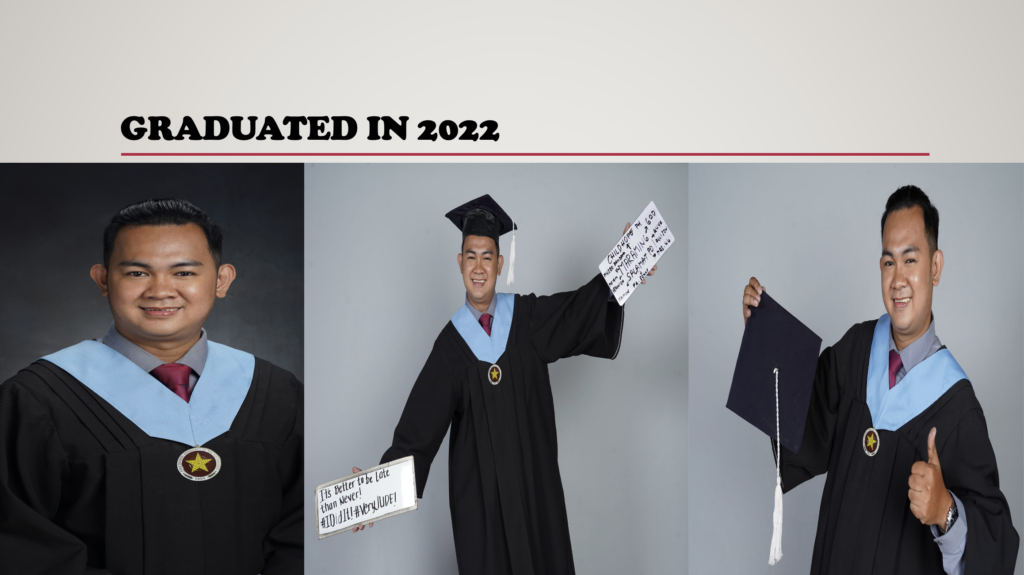
The Education systems in the Philippines
Jude concluded his presentation by discussing the realities of protection laws for children in the Philippines and the challenges faced by the education system, with special attention to the Filipino special education program and it’s challenges, drawing from his experience. He highlighted some key challenges that the Special Education Program in the Philippines faces:
- Lack of Resources: This included inadequate classrooms, insufficient numbers of teachers, and limited access to essential support services for children with special needs.
- Insufficient Teacher Training: Jude pointed out that teachers often lack adequate training in specialized methodologies needed to effectively educate children with diverse learning needs. This gap in professional development hinders the program’s overall effectiveness.
- Societal Attitudes: Negative societal attitudes and stigma surrounding disabilities create significant barriers to inclusion and can limit opportunities for children with special needs to fully participate in society.
- Personal Challenges: Students with special needs and their families face various personal challenges, such as financial constraints, lack of access to healthcare, and emotional stress. These factors can significantly impact the child’s educational journey and overall well-being.
Voices from the participants
After the presentations, the participants were divided into four groups for discussions. The participants discussed what surprised them the most, what they wanted to know more about, and what they thought they could do to improve the situation of the children.
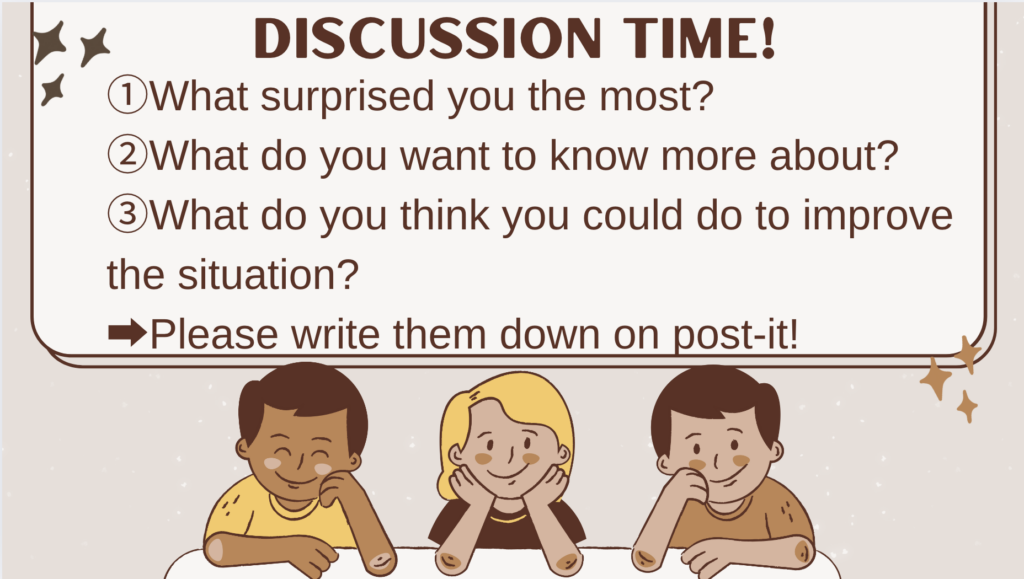
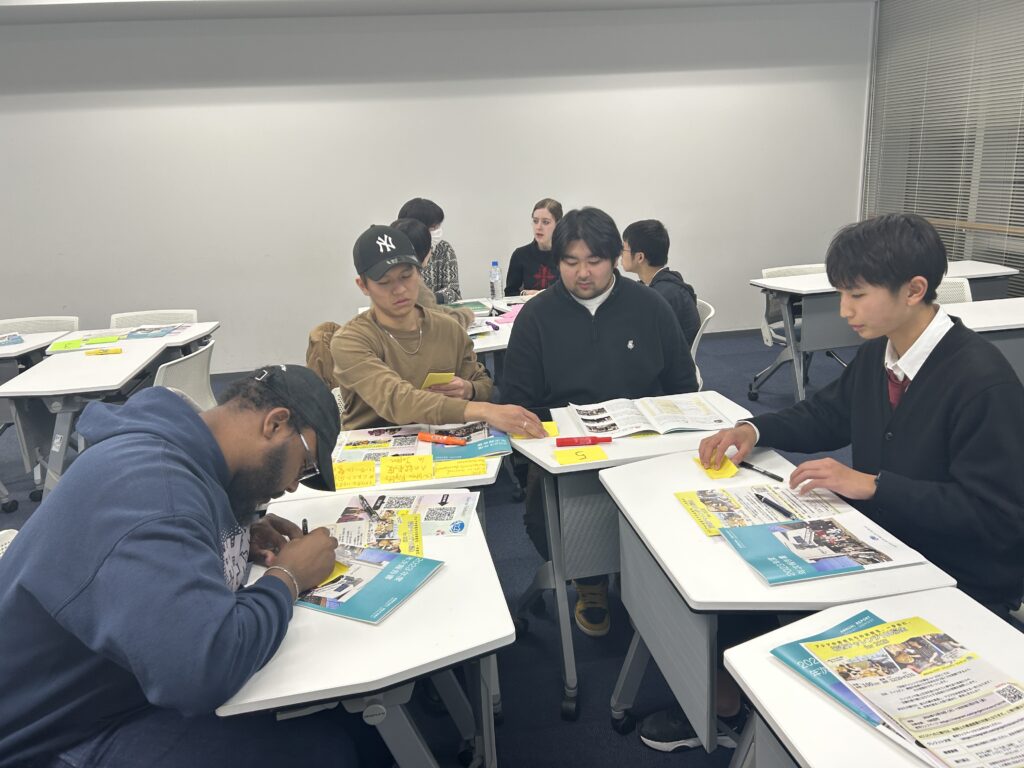
The participants had the opportunity to discuss in groups of 4, where they talked about various topics that interested them, such as:
- Connecting the topic to life and mental health issues of adults.
- Connecting the topic and the initiative to bring awareness to not only this topic but other topics too such as ‘Black lives matter’ and ‘Social Change’
- There were discussions about why the US, such a big country, has not ratified the UNCRC.
- Why adults are not aware of the rights of the child and how to make adults realise the situation was discussed among certain groups.
- How they imagined, what the children are going through.
- Amongst the groups there was a very reflective question on why there are so many shelters for people on the streets and so many actions to help, but why is there no change yet?
Following the discussions, the participants played a quiz game using the educational game application “Kahoot!” about the information they learned during the presentations. The winner of the Kahoot game received a prize.
What can we do?
The participants were asked at the end how they could be “MAD” (Making A Difference), where they came up with good and creative ways to do so.
- To provide opportunities of learning that to students at schools in Japan.
- To be able to talk about the topic to people who don’t know.
- To donate money to the organisations such as NGO/NPO’s who are active in working on those issues.
- Create more opportunities and events where people can share their opinions, talk about issues that society is facing.
- Share more successful stories just like Jude’s and make it more public.
- Create more funding from the government and more funding for the schools. Create more changes in educational systems.
The participants were surprised about the real situation of the children. It impacted them to learn more about the topic. The US not being part of the CRC is a main question for all the participants. They also wanted to learn about the child laws in japan and the real situation in Japan.
At the end of the event, the participants were asked to provide feedback via survey and to support and participate in activities of ACC21. A group photo was taken of the participants with Jude also appearing on screen.
Support you can start today
From December 10th, 2024 to January 31st, 2025, ACC21 is conducting the “Youth Challenge 100 Donation” campaign with a goal of 1 million Japanese Yen through the donation website “congrant” to raise funds for activities to advance the challenges of Asian youth.
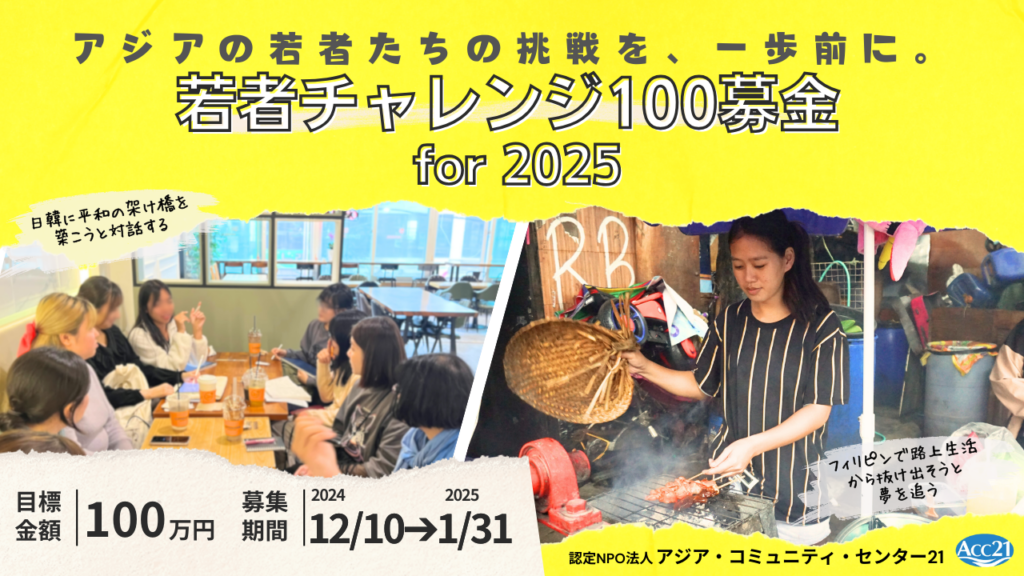
For more information, please visit the webpage of the crowd funding campaign.
Your warm support and cooperation will be greatly appreciated.

